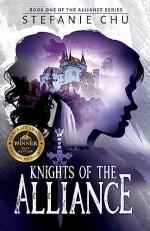|
This section contains 690 words (approx. 2 pages at 400 words per page) |
Coming Of Age
Mirari and Gaven's paths diverge as they face the complexities of adulthood, revealing the challenges of growing up. The narrative emphasizes the loss of innocence as Mirari and Gaven become fundamentally different individuals, to the extent that they no longer recognize each other when they reunite in adulthood. This coming-of-age exploration showcases the profound influence of personal growth on relationships and reminds us of the inevitable changes that accompany the transition from childhood to adulthood.
Identity
Throughout the story, several characters undergo journeys of self-discovery, learning more about themselves and their true potential. Shiba and Neo, for instance, find a way to honor the memory of their deceased comrade, Mecate, by embracing her passion for peace and carrying on her legacy through joining the Knights. Hime, Dorain, and Lucan undergo transformations as they break free from the expectations and identities imposed upon them by their family names. They carve out their own paths, defining themselves on their own terms and discovering their unique strengths and abilities. Kylah, initially reluctant to engage with the world, eventually recognizes the potential she holds to make a difference.
Additionally, Fangbane (Sokal), Starlight (Fareeha), and Mirari (Roselyn) live under false names. Their chosen names symbolize their journey of self-discovery and leaving behind their old selves. "Fangbane" comes from an old fable of a boy who bravely takes the venom of a serpent to save his village. It reflects Sokal's determination and commitment to protect others. "Starlight" represents Fareeha's resilience, her ability to shine amidst adversity, and her role as a guiding light for Sokal. "Mirari" is named after the Goddess of Miracles, as she is not only a survivor of many adversities but also a beacon of hope to those who cross her path. This is especially true for Gaven, who had lost most faith in humanity and finds comfort in the truth in Mirari.
Gaven also lives under a false identity; however, he did not choose a new name. It speaks to his deep-rooted belief that he is still the same person, regardless of his past or the hardships he has endured. He sees his transformation as growth rather than a complete change of identity, emphasizing his strong connection to his Althaean self. This theme of identity will be further explored in the second book, delving into Gaven's struggle to reconcile his past and present selves.
Grief
Grief is explored through Mirari, who is deeply affected by the disappearance and presumed death of her brother, Salathiel. Her relationships suffer as she struggles to cope on her own, and her ability to improve physically is hindered by her emotional state. The story highlights the delicate balance between seeking closure and finding inner peace in the face of profound loss. By the end of the novel, Mirari realizes that her grief and desire for vengeance have consumed her for too long. With support, guidance, and empathy from the new friendships she has forged, she learns to honor her brother's memory not through relentless pursuit for answers but by finding peace within herself.
Prejudice
Prejudice is a central theme in the novel, exemplified through nearly every character in the story. For example, Mirari faces discrimination based on her social standing and birthplace, while Gaven experiences biased judgment in the judicial system. The narrative paints a stark picture of a world torn apart by three warring empires, marked by deep-seated animosity and fueled by derogatory slurs like "flatty" and "featherpit." However, the Knights strive to dismantle prejudice, rallying together to demonstrate the power of unity and the potential for collective achievement that far surpasses the limitations of a divided society.
Power and Corruption
The novel explores the corrupting influence of power, particularly in the realm of political intrigue. Various factions, including the Council, regional leaders, and the Blessed, pursue power at the expense of ethics. The authority of the Council is marred by personal interests and hidden agendas, underscoring the susceptibility of those in positions of authority to corruption. Additionally, internal power conflicts within these factions illustrate the perils of uncontrolled power, such as the Blessed, leading to manipulation and moral compromises.
|
This section contains 690 words (approx. 2 pages at 400 words per page) |




